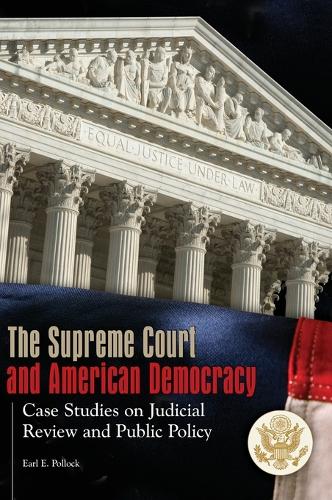
The Supreme Court and American Democracy: Case Studies on Judicial Review and Public Policy
(Hardback)
Publishing Details
The Supreme Court and American Democracy: Case Studies on Judicial Review and Public Policy
By (Author) Earl Pollock
Bloomsbury Publishing PLC
Greenwood Press
30th December 2008
United States
Classifications
General
Non Fiction
Legal systems: civil procedure, litigation and dispute resolution
457.5
Physical Properties
Hardback
432
Width 178mm, Height 254mm
907g
Description
There is almost no political question in the United States, wrote Alexis de Tocqueville, that is not resolved sooner or later into a judicial question. The U.S. Supreme Court is the ultimate arbiter of judicial questions, weighing the laws enacted by the people's representatives against the inviolable fundamental law embodied in the U.S. Constitution. Virtually every vital political and social issue comes before the Court: abortion, affirmative action, capital punishment, elections and voting, gay rights, gun control, separation of church and state, and more. This book presents living law, the case-by-case shaping of the law on each of these controversial issues, in the justices' own words and with informative commentary. There is almost no political question in the United States, wrote Alexis de Tocqueville, that is not resolved sooner or later into a judicial question. The U.S. Supreme Court is the ultimate arbiter of judicial questions, weighing the laws enacted by the people's representatives against the inviolable fundamental law embodied in the U.S. Constitution. Virtually every vital political and social issue comes before the Court: abortion, affirmative action, capital punishment, elections and voting, gay rights, gun control, separation of church and state, and more. This book presents living law, the case-by-case shaping of the law on each of these controversial issues, in the justices' own words. ; Guide to the Court's functions and the ways in which it goes about its work ; Topically organized sequences of cases through which the law on particular issues evolved, including the facts of each case; the specific issues before the Court; the Court's decision, embodied in the text of the majority opinion; an account of all opinions handed down; and excerpts from the most influential concurrences and dissents ; Commentary summarizing current federal law on each of the controversial topics covered, with notes on the historical backgroundand in some cases the turbulent aftermathof the Court's decisions
Reviews
Pollock, an attorney, considers the controversial role of the US Supreme Court in public policy issues and specific cases relating to abortion, gay rights, physician-assisted suicide, racial segregation, affirmative action, slavery, due process, elections and voting, freedom of expression, church and state, the powers of the president, capital punishment, gay rights, religion, and property rights. He summarizes the basic constitutional law principles, explains the Court's function and work, and recounts the background and aftermath of decisions in specific cases, with summaries of all filed opinions. * Reference & Research Book News *
Author Bio
Earl E. Pollock served as a law clerk for chief justices Fred M. Vinson and Earl Warren and participated in drafting opinions during one of the most exciting eras in U.S. Supreme Court history. He became Assistant to the U.S. Solicitor General and later had a long and distinguished career as a partner in a private law firm. He is the author of numerous law review articles.
